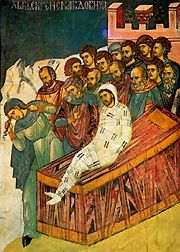Luke 7, 11-17
And it came to pass that on
the next day Jesus went into a city called Nain, and his disciples and a large
crowd went along with him. And as he drew near to the gate of the city, they
became aware that a dead man was being carried out—the only born son of his
mother, and she was a widow. And a large crowd of people from the city
accompanied her.
And seeing her the Lord felt her suffering, and
said to her, “Weep no more.”
And approaching, he touched the coffin, and
pallbearers stood still. He said, “Young man, I say to you, arise!”
The dead man sat up, and began to speak. And Jesus
gave him to his mother. Astonishment and awe seized all who were standing
there, and they began to praise God and to glorify what was here revealed,
saying,
“A prophet powerful in spirit has been raised among
us, and God has come down to us, his people.”
Luke 7: 11-17
Fruits of the vine are ripe. They enclose the seeds for new
life. In nature, the fruit falls and dies away, releasing the seeds to begin a
new cycle of life. But they can also be tended and harvested to another
purpose—to be made into wine.
Today we hear of the young man, the fruit of whose life had
fallen green. Christ catches his soul; He finds the soul’s seed of the new, and
plants it again on the earth. This is Christ as the great Gardener. He is
tending a harvest for his Wine. But no matter whether the soul’s fruit falls
early or late, He is concerned with ongoing life, with the seeds within; He
preserves them, carrying them and planting them where they next need to go.
In one lifetime, we may ripen soul fruits of many kinds.
When ripe, the fruits must separate from the vine on which they grew, for their
current cycle is finished. Things end, sometimes painfully. But what is valuable
in our soul, the ripened sweetness, we can offer for the wine harvest. Our
soul’s purest thoughts, our most noble feelings, the dedication of our will,
form the sweetness of the soul’s fruit. These we can offer for the wine. What
is viable in our soul fruit, seeds for the future, are gathered up by our
angel, under the direction of the Master Gardener. They will be preserved, to
be planted, to grow and develop. It may be in another place and time. It may be
for an entirely new and different purpose. But even in all of life’s apparent
endings, the living seeds are not lost. Knowing this, we can keep trying, keep
working to ripen our inner fruit, developing the sweetness, even late in whatever
cycle we find ourselves.
So now, in all the layers of our autumns, we can say with
Rilke:
Lord: it is time. The summer was great.
Lay your shadows onto the sundials….
Command the last fruits to be full,
give them yet two more southern days,
urge them to perfection, and chase
the last sweetness into the heavy wine.[1]







